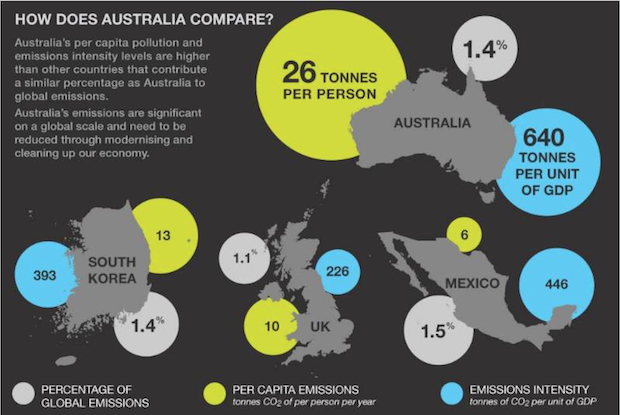Australia’s carbon pollution reduction targets, revealed this morning by The Australian newspaper, have been slammed as woefully inadequate by stakeholder groups who argue a cut of 19 per cent below 2000 level emissions by 2030 is a definitive "fail".
Australia’s current target – for the period up to 2020 – rests at a reduction in carbon pollution of between 5 and 25 per cent and has been calculated against a ‘base year’ of 2000 level emissions.
However, successive governments have been quite on any cuts above a 5 per cent target. The higher targets – of 15 to 25 per cent below 2000 levels – were supposed to be conditional on international action and scientific consensus.
Reporting this morning reveals that the Abbott government has changed the base year our emissions are measured against from 2000 to 2005, which is significant because Australia’s emissions were particularly high in 2005.
This has the effect of making the target announced today – around a 26 per cent reduction on 2005 levels by 2030 – look bigger than it actually is.
If you stick with a year 2000 level baseline, the cut flagged in The Australian this morning equates to just over a 19 per cent reduction by 2030, which is significantly below the cuts promised by America, Canada and the European Union for the post 2020 period.
Reacting to the news Kelly O’Shanassy, Chief Executive Officer of the Australian Conservation Foundation, dismissed the government’s plan as “a defeatist target that shows no faith in the ability of Australians to adapt, innovate and make the transition to a clean economy”.
“This target is lower than the upper end of Australia’s existing target of 5 to 25 per cent by 2020,” O’Shanassy said. “It adds a decade and leaves the next generation to pick up the tab."
The target has also been dismissed as “a joke” by the Acting National Director of GetUp!, Paul Oosting, who said “the vested interests of the big polluting mining and energy companies would thank Tony Abbott”.
Reports in The Australian this morning suggest the government will seek to justify its low-bar target by citing high population growth, but Oosting argues that “the bottom line is a healthy economy relies on a healthy environment”.
“Countries all over are harnessing the worldwide clean power boom while Australia lags behind and misses out on the innovation, investment and jobs that come with it,” Oosting said.
As New Matilda reported this morning, the Australian Capital Territory has emerged as one beacon in the generally bleak climate policy landscape and is seeking to attract jobs and investment that have been damaged by federal hostility to action on climate change.
Overseas, however, things are moving more quickly, as the world gears up for major UN-backed climate change negotiations in Paris later this year, which aim to map out a trail for global action over the coming decade.
Different base years will create different impressions of ambition depending on the country, because they will have had periods of higher or lower emissions at different times, so it’s difficult to compare the relative ambition of comparable countries.
“Over the next few days, there will be a lot of spin to try and confuse Australians into thinking that we are doing more than we actually are,” the Climate Council’s Professor Tim Flannery warned this morning.
One way to put things in perspective is to know that Australia’s per-capita emissions are the highest in the OECD, so any reductions are coming from a low (or rather, high-emissions) base.
Australia’s per capita emissions are more than three times those of the European Union, Japan and China.
Our economy’s emissions intensity – effectively the amount of carbon emitted per unit of GDP created – is roughly twice as high as that of the United States, and two and a half times that of the European Union.

It’s also worth noting that the government has fallen well short of the cuts recommended by its independent advisor, the Climate Change Authority, which had suggested reductions of between 40 and 60 per cent by 2030, based on 2000 level emissions.
Effectively, the government’s level of ambition comes in at just under half of the minimum reduction recommended by the Climate Change Authority.
The National Director of the Australian Youth Climate Coalition, Kirsty Albion, said that level of ambition is “out of step with the science, out of step with the world and out of step with what the community wants”.
Polling released yesterday showed that two thirds of Australians think the government’s not taking climate change seriously enough.
“Tony Abbott must stop failing young people and take our future seriously before the Paris climate talks,” Albion said.
Donate To New Matilda
New Matilda is a small, independent media outlet. We survive through reader contributions, and never losing a lawsuit. If you got something from this article, giving something back helps us to continue speaking truth to power. Every little bit counts.



